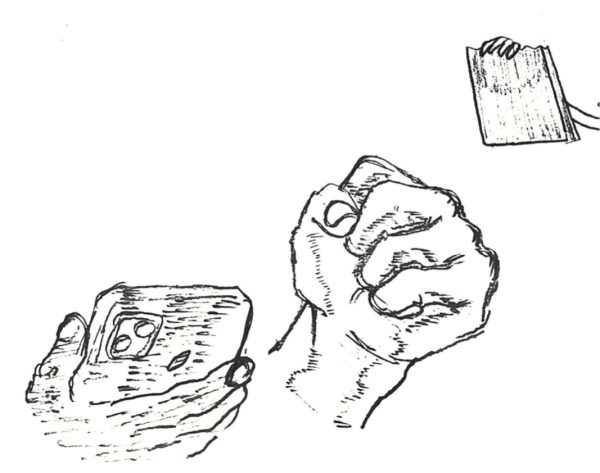Essay: How The Internet Destroyed The Human Experience
January 31, 2022
Next time you leave your house, look around you. What are people doing? What are they paying attention to as they go about their lives? If you asked that question 20 years ago, they may have been looking around them—at least where they were going—or they may have been conversing with others.
If you ask that question today, the odds are that the vast majority of people—even young children—will be interacting with their phones or a similar electronic device in one way or another. People text and walk, text and drive, and even text while “spending time” with others. Or, they might be one of the more than 80% of people who prefer to engage in conversation with robots.
It’s difficult to comprehend the degree to which post-industrial technological innovation—more specifically, the internet and artificial intelligence, weaponized by the companies that control them—has crippled humanity. Our society’s lack of meaningful relationships can be attributed almost single-handedly to the prevalence of artificial, shallow connection replacing organic conversation.
The effects of the social barrier we constantly erect around ourselves are vast. In reality, as we grow more “connected” via our devices, and spend more time engaging with them, the less time we spend in the real world, absorbing the beauty nature has to offer or experiencing organic and truly meaningful relationships.
Nowadays, entertainment is everywhere, and it has made us weak-minded; like Pavlov’s dogs, our brains practically drool with every notification-induced dopamine surge from our phones, buzzing and dinging away. We’re obsessed with distraction, and we wonder why depression is so rampant in modern society.
The primary harmful effect of being conditioned to rely on software for instant gratification is the dependency that one develops to using it, obscuring productivity outside the metaphysical sphere of the internet.
In 2022, it’s easy to organize, sort, and keep track of massive amounts of data at the push of a button, but it’s increasingly more difficult to find the motivation to complete assignments, pursue personal goals, and accomplish necessary tasks to better our own lives. As entertainment surrounds us, envelops us on all our devices, we become more dependent on it.
We turn to our cell phones and computers when we are bored to be entertained. When we do not have these devices available to us, we feel like a smoker without a light. But when we do have access to it, like the smoker, we are totally consumed by it. Our minds are completely occupied with the one goal of being entertained.
Existing in this state of perpetual mental numbness is the modern drug; other priorities fade away, as we escape from reality, training ourselves to become master procrastinators. It’s far easier to move a thumb across a screen and be effortlessly occupied than to get up and do something productive; it takes work, discipline, and willpower, and thanks to the internet, and the subsequent erosion of these traits, we have entered an era infected with laziness and unproductivity.
This addiction is no accident. Tech companies admit that they want you devoting more and more of your time to their service, and their algorithms constantly get better and better at predicting what will keep you watching—what will make it even harder to resist the temptation of that next YouTube video, harder to get up and complete something meaningful with what remains of your precious time. This is textbook addiction through psychological manipulation, and it affects almost all of us. Big tobacco could only dream of getting this many people hooked.
Remember, if it’s free, you are the product.
I would be remiss if I didn’t briefly address big tech’s monopoly on the flow of information, which, along with portrayals of their worldview in nearly all mainstream media and entertainment, is used to manipulate our thoughts and beliefs, influence our choices and habits, and ultimately shape our lifestyles, and even how we spend our money.
The internet is both the most successful social engineering program and the most effective marketing tool in human history. These companies, like evil scientists, observe us through millions of conveniently located cameras and microphones within our devices, studying our behavior so they can learn how to better take advantage of it, or modify it altogether. The amount of control these tech companies have over our individual lives is astonishing. As Jim Morrison famously put it, “Whoever controls the media controls the mind.”
Now, it could be said that these negative effects can be corrected by regulation. It could be said that they are magnified by the current political climate. It could even be said that engaging in or using this type of technology is a choice people make daily, which, to some extent, is true.
But here’s the bottom line: everyone uses the internet. Even individuals without smartphones or computers rely on services that require the internet to function, and events and decisions that occur because of things that take place on the internet affect all people. On a global level, society has become completely dependent on this wicked innovation.
The infamous Theodore Kaczynski predicted this societal dependence in his manifesto, Industrial Society and its Future. I must iterate my strong opposition to Kaczynski’s horrific acts of violence. However, concerning this issue of constant technological innovation and the inevitable usurpation of freedom, he is absolutely correct: “Once a technical innovation has been introduced, people usually become dependent on it, so that they can never again do without it, unless it is replaced by some still more advanced innovation. Not only do people become dependent as individuals on a new item of technology, but, even more, the system as a whole becomes dependent on it.
“In many cases the new technology changes society in such a way that people eventually find themselves FORCED to use it.”
The internet, artificial intelligence, and computers have brought us many tools and have made accomplishing tasks astronomically easier. They’ve put thousands of albums onto a microchip less than a centimeter wide. They’ve made an entire universe of data and information accessible at any time, at the press of a button. They’ve expedited communication and relayed messages between millions of people across millions of miles—instantaneously.
Yet they’ve also contributed to turning brothers and sisters on each other within their own homes. They’ve contributed to a loss of individuality and productivity. They’ve been responsible for changing public opinion and policy across the globe thanks to their monopoly on information. They’ve disconnected us from reality—from the world around us, from each other, and from God. And they have made an entire generation dependent on access to a world of shallow connection and mindless entertainment.
These companies have exposed their motives, and what lengths they will go to in order to sell our attention, our time, and our data. It’s doubtful they wouldn’t sell our very souls. For now, we remain at the mercy of these technological overlords. We have lived without the internet and artificial intelligence for tens of thousands of years, but it is uncertain how long we will live since its inception.
At this point, it’s out of our hands. The genie is out of the bottle, and there is no going back. All we can do is wait and see which direction it steers us.
Irrespective of our future, it has become clear in the present day that the internet has damaged the human spirit and altered the trajectory of our species to a horrifying degree. Our ancestors are rolling in their graves at who we’ve become thanks to technological “progress.” We are among the first who have to deal with that cold, hard truth and the aftermath of this destructive commodity.











pd • Jan 18, 2024 at 6:12 AM
This is unfortunately not a new concept for me. I stopped about half way through the article because, ironically, reading it on a digital device is just more preparation of the very problem. As is each character I write in this box.
The question that is so crucial is … what do we do about it? I would suggest it’s arguable that simply suggesting we get back to nature or go talk to people in person is not as simple as it seems. Nor is it perhaps enough. Whilst I’m not in any respect a qualified anthropologist, we are now surrounded by such a saturation level of devices, is it already too late to even invest an entire morning or afternoon without be influenced by one? Is that too blanket of a concept? I personally connect with nature for up to a few continuous hours daily. Not so much by choice and organisation as necessity. I do so as isolated from humans (and their ever larger canines) as possible for a variety of reasons (that often ostensibly add up to misanthropy) that a mainstream, everyday human would not necessarily understand. Regardless though, said time is so much more valuable to my wellbeing than I can explain … despite doing absolutely nothing digital, and very little at all.
I encourage anyone and everyone to not only put down their devices for as many hours a day as possible, but to undertake as much zero-thinking time away from other humans as possible, in addition to finding as much meaningful human connection as you feel you need. Do not necessarily limit yourself to in-person conversations as an alternative or antidote to digital dictatorship by proxy. Why? Unless you are confident your in-person human(s) can communicate meaningfully, without for example just regurgitating digital ‘culture’ (anything from apeing their personality based on tv sitcoms to “and I was like” to genuinely show and telling you what they’ve consumed on their phone … sharing a single screen instead of eradicating them for X minutes) to you, then to truly escape the psychological impact of the digital destruction of our minds, it’s probably necessary to eschew human ‘connection’, somewhat, however much is right for you, during device-free time.
Such very anthropologically extreme times we exist in. Books were going to die. Newspapers, magazines. Nope. If anything, the single-tasking nature of books and fixed, complete nature of other printed media is as much as antidote to the problem as anything.
Robbie • Sep 3, 2023 at 4:42 AM
Wow, what a well written and true article. I always feel like the only one who understands this as everyone around me is now completely consumed by this beast system of technology and internet. It is the true pandemic. Having lived before and during the internet existence, I know life was so much better before. The points made here are accurate and still only a sliver of how damaging and disgusting this evil truly is. The people who should have known better, those elders living before, were obviously not strong enough, spiritually and mentally, to avoid this takeover; not enough discipline and foresight. I’m usually the only person not walking around on a computer (phone, tab, whatever). All “friends” and family are all so different now, for the worse. People are now stupid, annoying and boring. Solitary time is my only escape from this zombie, walking dead land that we now tread. My hope and prayer is to find others who are still “real”. Peace
Steven Dauria • Jan 2, 2024 at 8:39 AM
Rob-
I feel the same way. The catch 22 however is that we are typing right now here.
F g • Dec 27, 2022 at 6:18 PM
Couldn’t agree more